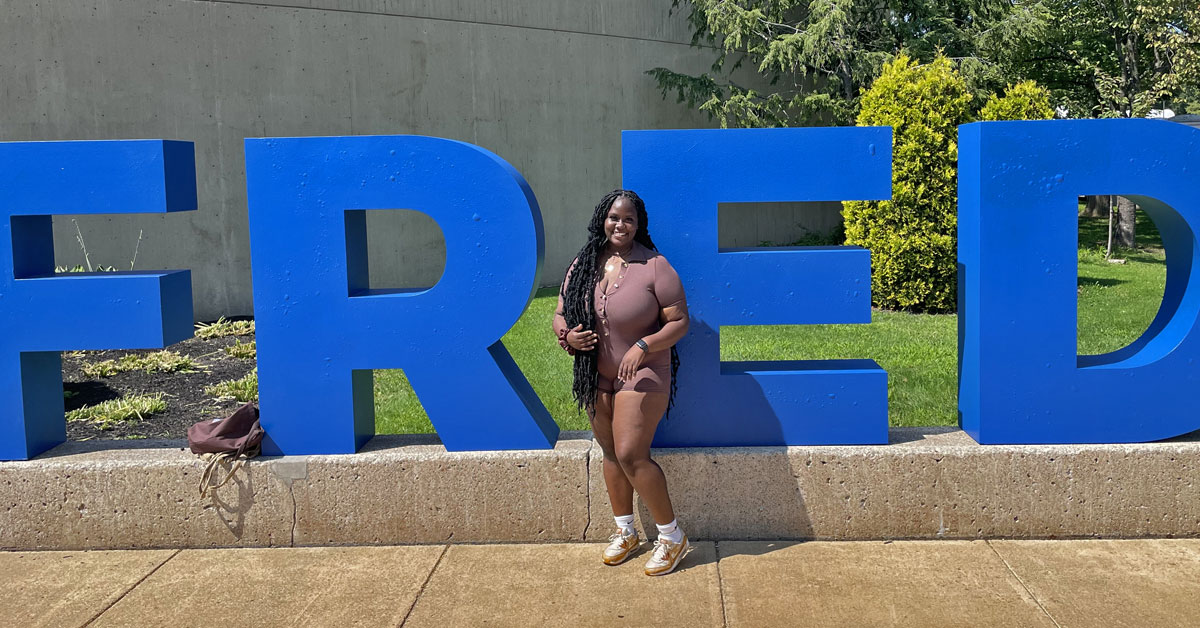
Tanique McLune, a current student at SUNY Fredonia, first recalls struggling with her mental health when she was still living in Jamaica.
McLune shares, “Looking back I realized I kind of struggled with my mental health because I’m very introverted and I don’t really speak much unless I need to. … I grew up in a single-parent household. [With] my mom being at work and my sister being at school, I never really had anyone to speak to, so I always was in a state of depression or I would get very anxious because my mind would wander off…”
The main source of McLune’s worries during this period of her life surrounded her future and whether she’d be successful five or ten years down the road. For a time, she didn’t see a future for herself or pursuing a college or career.
McLune ended up moving to the United States in 2016 to live with her father and other siblings, eventually enrolling at SUNY Fredonia. As a freshman, she was forced to be outside of her comfort zone, which brought about some tough moments.
“My real issue with mental health started when I was a freshman in college. That’s where my real isolation really took place because I was very stressed because I wasn’t doing as well as I really wanted to, and I was going through different routes in order to ease that pain,” McLune says.
Giving Therapy a Second Chance and Finding a Silver Lining Amidst the Pandemic
On campus at Fredonia, McLune felt the stress from adjusting to a new lifestyle and taking on more responsibilities, such as becoming a resident assistant. Thankfully, she was able to connect with a therapist who helped her process her emotions and work through her struggles.
“Luckily, I was able to speak to a woman of color who understands what it’s like to be a young, Black professional, which was something that I kind of struggled with being that I go to a predominantly white institution.”
Then, the pandemic hit, and McLune used the time and space away from campus to get to know herself better, and that she’s more than her depression and anxiety.
“Unlike other people–I know a lot of people struggled during COVID–COVID kind of made me realize that there is more to me than just being the girl that has depression or the girl that gets anxious or any kind of mental health issues I was dealing with,” McLune shares.
After this period of self reflection, McLune set a goal of consistently going to therapy for at least one semester, and was able to move forward with her mental health as a result. She received a diagnosis, discovered that medication wasn’t necessarily the route for her in treating her mental health, and built the foundation to be in a positive headspace.
Using Hardships to Help Others Through Their Struggles
Today, McLune is set to graduate a semester early, is getting a jump on submitting graduate school applications, and is also making time to network with individuals to set herself up for academic and career success. And, she has plans to use her education to enter a career where she’ll be helping others navigate their mental health journey.
“I’m a psychology major, I’m getting my master’s in social work, so that’s the route I want to go in. … If I can help one more person do it and help save one life then I would have a purpose in life, which I didn’t feel like I had a purpose before,” notes McLune.
McLune first developed her passion for wanting to help others through being an RA at SUNY Fredonia, despite some initial setbacks. Through mentoring her residents through tough times of their own, McLune realized she wants to help others feel like they’re not alone.
“I went through a lot between the ages of 15 to 20, but now I’m 21 and I feel like I’m doing way better than I was like three or four years ago because I took it upon myself to get the help. Being an RA, I know that it’s difficult for some people to take that initiative and be like I want to get better, but that’s kind of what I want to do,” says McLune.
Mental Health Makes Us Human
McLune recognizes that there are other factors that can get in the way of reaching out for help as well, and shares her perspective on how mental health stigma affects the Black community:
“In the Black community, mental health is often looked as something that we don’t struggle with. You’ll tell your parents oh, I feel depressed, and they’re like you can’t be depressed, you’re a child, you have no responsibilities, which is not true. There are multiple different ways where you can get depressed.”
She also feels that society still makes mental illnesses out to be scary or something to be fearful of, when that shouldn’t be the case. Her main piece of advice to fight this stigma? To talk about mental health and normalize these conversations to show others that they’re not alone in their struggles, and that it’s okay to reach out for help.
“Mental health doesn’t break you, it makes you human just like everybody else. It doesn’t matter your socio-economic status, what class you consider yourself in, your race, anything like that. Everyone struggles, and it is okay to struggle, and it’s okay to reach out for help because help is there. People are there to help you at any given time, wherever you are,” says McLune.
Resources to Help Make Mental Health Care Routine
There are many ways to stay on top of your mental health, from talking to friends and family about your problems to setting a counseling routine with a trained professional. Throughout the SUNY system, each campus either has an on-campus counseling center or provides access to community mental health resources to help students. If you or a friend is in need of help, visit SUNY’s mental health resources page.
If you are currently experience a crisis, reach out to one of the following resources:
National Suicide Prevention Lifeline:
1-800-273-8255
(1-800-273-TALK)
New York State COVID-19 Emotional Support Hotline:
1-844-863-9314
Veterans Crisis Line:
- Call: 1-800-273-8255 (1-800-273-TALK) and Press 1
- Text: 838255
- Chat: https://www.veteranscrisisline.net/get-help/chat
Support for deaf and hard of hearing:
- Chat and text message (838255)
- For TTY users: Use your preferred relay service or dial 711 then 1-800-273-8255. Or chat with us.



